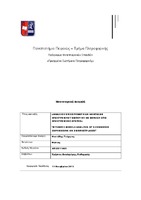Ανάλυση επιχειρηματικών μοντέλων ηλεκτρονικού εμπορίου με έμφαση στις ηλεκτρονικές αγορές
Business models analysis of e-commerce emphasising on e-marketplaces

Προβολή/
Θεματική επικεφαλίδα
Ηλεκτρονικό εμπόριο ; Επιχειρηματικός προγραμματισμός ; Επιχειρήσεις -- ΑνταγωνιστικότηταΠερίληψη
Το ηλεκτρονικό εμπόριο αντιπροσωπεύει μια από τις σημαντικότερες εξελίξεις στον κόσμο των επιχειρήσεων. Με την εξάπλωση του κυβερνοχώρου, οι επιχειρήσεις διαθέτουν μεγάλα περιθώρια βελτίωσης της ανταγωνιστικότητάς τους, αυτοματοποιώντας τις διαδικασίες προμηθειών. Σε αυτόν τον τομέα, έχει αρχίσει να διαμορφώνεται ένας καινούργιος τρόπος διεκπεραίωσης των συναλλαγών, βρίσκοντας υποστήριξη στη νέα τεχνολογία και τις εξελίξεις στο ηλεκτρονικό επιχειρείν. Οι εταιρείες εκείνες οι οποίες θα καταφέρουν να κατανοήσουν τη δυναμική του ηλεκτρονικού επιχειρείν και να εκμεταλλευτούν τις δυνατότητες τις οποίες αυτό προσφέρει, έχουν ελπίδες να αποκτήσουν συγκριτικά πλεονεκτήματα στη νέα οικονομία. O χώρος του e-business, και ιδιαίτερα το κομμάτι, το οποίο έχει σχέση με τις συναλλαγές μεταξύ επιχειρήσεων (B2B), αναμένεται να σημειώσει σταδιακή ανάπτυξη στα επόμενα χρόνια, επισκιάζοντας τις συναλλαγές επιχειρήσεων με πελάτες (B2C). Στις εξελίξεις του ηλεκτρονικού επιχειρείν εντάσσονται και οι B2B ηλεκτρονικές αγορές (Β2Β e-marketplaces), οι οποίες κάνουν την εμφάνισή τους σε κάθε κλάδο της βιομηχανίας. Οι εταιρείες που συνδέονται σε αυτές και τις αξιοποιούν, βελτιώνουν το ανταγωνιστικό τους πλεονέκτημα και συμβάλλουν στην ανάπτυξη των εφοδιαστικών αλυσίδων του μέλλοντος. Οι πρώτες επιχειρηματικές κινήσεις στο χώρο του ηλεκτρονικού λιανικού εμπορίου (B2C) ξεκίνησαν από τα τέλη της δεκαετίας του ’90, ενώ στο χώρο των διεπιχειρησιακών ηλεκτρονικών αγορών (B2B) από το 2000, και γρήγορα βρήκαν ανταπόκριση από τις ελληνικές επιχειρήσεις. Οι δυο αυτές μορφές επιχειρηματικής δραστηριότητας φέρνουν μια επανάσταση όσον αφορά τη διεξαγωγή του εμπορίου διότι τροποποιούν την εφοδιαστική αλυσίδα, μειώνουν σημαντικά κόστη που προκύπτουν από αυτή και εξοικονομούν πολύτιμο χρόνο για τη σημερινή εποχή. Επιπλέον, από το B2C ηλεκτρονικό εμπόριο και από το Β2Β προκύπτουν σημαντικές διαφορές, είτε αφορούν το κοινό στο οποίο απευθύνονται, τον τρόπο συναλλαγής, πληρωμής, είτε το επίπεδο ασφαλείας. Είναι γεγονός ότι σε αυτό το μεταβαλλόμενο περιβάλλον, είναι αναγκαία η μελέτη της παρουσίας των ελληνικών επιχειρήσεων στο ηλεκτρονικό επιχειρείν από τη σκοπιά της στρατηγικής. Παρόλο που η διεθνής βιβλιογραφία σχετικά με τη δραστηριοποίηση στο ηλεκτρονικό εμπόριο και τις αντίστοιχες στρατηγικές είναι πλούσια, η αντίστοιχη ελληνική βιβλιογραφία είναι περιορισμένη. Ιδιαίτερα δε όσον αφορά τη στρατηγική χρησιμοποίηση του ηλεκτρονικού εμπορίου και των δυνατοτήτων που παρέχει η νέα τεχνολογία. Η παρούσα διπλωματική εργασία αποσκοπεί στην αποτύπωση θεμάτων που προκύπτουν από τη υιοθέτηση του ηλεκτρονικού επιχειρείν από τις επιχειρήσεις και στην ανάλυση του είδους των ηλεκτρονικών συναλλαγών που μπορούν να διεκπεραιωθούν μεταξύ τους. Αρχικά, θα γίνει μια προσπάθεια να αποσαφηνιστεί ο ορισμός των διεπιχειρησιακών ηλεκτρονικών αγορών, καθώς επικρατεί μια γενικότερη σύγχυση όσον αφορά την εννοιολογική τους προσέγγιση. Παράλληλα, θα γίνει μια καταγραφή του ελληνικού τοπίου όσον αφορά τα Β2Β e-marketplaces. Απώτερος στόχος της έρευνας, είναι η διερεύνηση της προσφοράς προστιθέμενης αξίας προς την επιχείρηση (προμηθευτή ή αγοραστή) με την υιοθέτηση συστημάτων ηλεκτρονικού εμπορίου, η ανάλυση του ανταγωνισμού με το στρατηγικό μοντέλο του Μ. Porter και η ανάλυση των παραγόντων που επηρεάζουν το ανταγωνιστικό πλεονέκτημα μιας ηλεκτρονικής αγοράς. Επίσης, στόχος της συγκεκριμένης εργασίας, είναι η ανάπτυξη και η παρουσίαση ενός προτεινόμενου μοντέλου αξιολόγησης της επιτυχημένης λειτουργίας των δύο κατηγοριών ηλεκτρονικών αγορών, δηλαδή των Β2Β και B2C e-marketplaces. Για κάθε ένα μοντέλο από αυτά, θα γίνει ανάλυση των παραγόντων, οι οποίοι επηρεάζουν τόσο τη συμμετοχή των προμηθευτών και των αγοραστών στις ηλεκτρονικές αγορές όσο και το ανταγωνιστικό πλεονέκτημα μιας ηλεκτρονικής αγοράς και που συμβάλλουν στη διατήρηση του σε βάθος χρόνου. Όλα αυτά συνυπολογίζονται και αποτελούν τα κριτήρια που οφείλει να λάβει υπόψη της μια επιχείρηση, ανεξάρτητου δυναμικής και κλάδου, για την κατάλληλη επιλογή της ηλεκτρονικής αγοράς που θα ανταποκριθεί καλύτερα στις προσδοκίες της.


